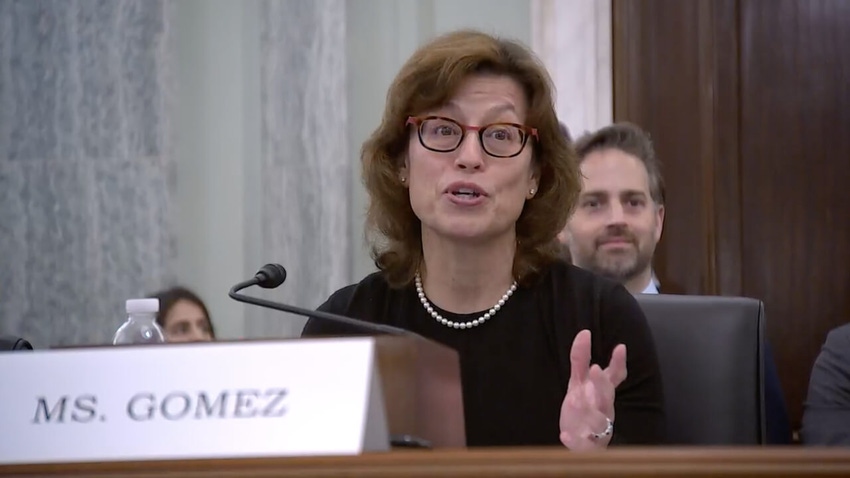FCC nominees weigh in on digital discrimination, Title II and more
At a Senate hearing, Anna Gomez, President Biden's pick for FCC Commissioner, said she supports reclassifying broadband under Title II but does not support rate regulation.

The Senate Committee on Commerce, Science and Transportation held a hearing to consider nominations to the FCC on Thursday, including the renomination of Commissioners Brendan Carr and Geoffrey Starks, and the nomination of Anna Gomez, announced by President Biden last month. The committee also considered the nomination of Fara Damelin for FCC Inspector General.
The hearing comes as the FCC reaches more than two and a half years with a two-two deadlock between Democrats and Republicans. Gigi Sohn, President Biden's first nominee for the fifth spot, withdrew from consideration in March following three Senate hearings.
Overall, the hearing offered no great surprises, nor a sense of when the Senate may vote on the nominees. But the nominees, and Senators, gave hints on where they stand on a range of topics relevant to the broadband industry. Here are some takeaways.
On digital discrimination
An issue set to come up for a vote before the Commission by the end of this year is rulemaking on digital discrimination. Congress in the 2021 Infrastructure Investment and Jobs Act (IIJA) required the FCC to "adopt final rules to facilitate equal access to broadband internet access service" within two years. One topic up for debate, and an area of disagreement between the industry and consumer advocates, is whether the FCC should define digital discrimination as solely "intentional" – as preferred by the industry – versus defining it as practices that produce disparate outcomes, as encouraged by some advocacy groups.
Nominees were pressed on the matter from both sides, first by Sen. Ted Cruz (R-TX), who suggested the Biden FCC is "declaring that the Internet is racist" and asked nominees whether they think there must be "clear evidence of discriminatory motive" for companies to be guilty of digital discrimination.
While Commissioner Carr (one of two Republicans on the FCC) told Sen. Cruz that he agreed "you need something more than your effect," he later told Sen. Ben Ray Luján (D-NM), when further pressed on the matter, that "there are things short of smoking gun that could be sufficient evidence to qualify for discrimination."
Commissioner Starks, a Democrat, declined to offer a direct answer, noting that the FCC is currently considering that question among others on digital discrimination.
Gomez, who would be the third Democrat on the FCC if confirmed, also declined to comment directly, telling Sen. Cruz: "The issue of digital discrimination is something I know Congress tasked the Commission with looking at last year, but I need to be able to sit down and dig into the record and look at the notice of proposed rulemaking in order to be able to give you an informed answer."
On Net Neutrality and Title II
The FCC is also likely to vote on reinstating Net Neutrality rules and restoring classification of broadband as a Title II service, which would subject the industry to common carrier regulations.
Nominees and Senators were in general agreement that the issue should preferably come before Congress, but that the FCC may need to take action.
Asked whether she supports restoring Title II classification, Gomez said she did – but she also expressed a lack of support for regulating rates.
"I would be supportive of a reclassification to Title II. However ... I don't support rate regulation because I think that competition is the most effective regulator," she said.
On broadband data caps
Rate regulation was further discussed in the context of a recent notice of proposed rulemaking issued by Chairwoman Jessica Rosenworcel, exploring whether the agency should take action on broadband data caps.
Asked about the issue, Commissioner Carr said he felt a ruling on data caps would "effectively amount to rate regulation." Offering the example of a $30 data capped plan that may be more affordable to some than a $70 data unlimited plan, he said: "For the FCC to come in and outlaw that $30 offering certainly seems to me a lot like rate regulation."
Gomez, when asked, said she was not familiar with the details of the Chairwoman's notice but reiterated her point about rate regulation: "That is certainly not something I think is necessary today. I think competition is the best regulator of prices," she said.
On the Universal Service Fund
Senators also raised questions about the future of programs supporting high-cost and affordable broadband, including the Universal Service Fund (USF) which Commissioner Carr described as "stuck in a death spiral" due to its dwindling contribution base. Carr supports the view that edge providers and Big Tech companies should pay into USF.
Without going into detailed discussion of reform, Gomez stressed the importance of the USF and said she would work with the committee, if confirmed, "on addressing ways to ensure that we can protect the program going forward."
The subject of the Affordable Connectivity Program (ACP) also came up briefly, with Sen. Raphael Warnock (D-GA) asking nominees how the FCC can help enroll more households. Commissioner Starks pointed to FCC grant programs like Your Home, Your Internet, which are currently supporting efforts to enroll more homes in ACP.
On that front, Gomez expressed support for the program, and she shared her own experience with poverty and having to routinely call her brother to ask for $34 to pay her phone bill.
"I very much understand how difficult it is for families, especially low-income families, to make these decisions but yet still maintain that connectivity that is so vital to us today," she said.
Related posts:
— Nicole Ferraro, editor, Light Reading, and host of "The Divide" on the Light Reading Podcast.
About the Author(s)
You May Also Like












